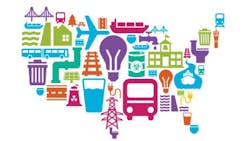ASCE unveils its report card for 2021 on America’s infrastructure
The American Society of Civil Engineers (ASCE) revealed its 2021 Report Card for America’s Infrastructure on March 3, which evaluated 17 categories across the nation and is released every four years.
Transit’s score remained unchanged from the last report card released in 2017, coming in at a D minus—the lowest score out of the categories. Rail’s score (includes passenger and freight rail) also remained unchanged, coming in at a B.
In addition to the scores, the report noted that 45 percent of Americans don’t have access to public transit. Simultaneously, many transit systems are aging and lack the funds to keep up to date on the State of Good Repair, which ASCE says is being exasperated by the COVID-19 pandemic. In total, 36 percent of the transit maintenance and storage facilities across the U.S. are in poor condition and over a 10-year period, 19 percent of vehicles and six percent of fixed guideway elements such as tracks and tunnels were rated in poor condition. There is also a $176-billion State of Good Repair backlog, a deficit that is expected to grow to more than $270 billion through 2029, the report states.
Other highlights of the report include:
- Over the past two decades, 52 new systems and 124 extensions have opened.
- Buses operate on more than 226,000 miles of streets and roads.
- Commuter and hybrid railroads operate on more than a combined 9,227 miles.
At the virtual unveiling event of the report card, ASCE featured a panel of transportation professionals to talk about the possibility of still delivering a big and bold transit vision. Both Los Angeles County Metropolitan Transportation Authority (L.A. Metro) CEO Phillip Washington and American Public Transportation Association (APTA) Chair and Metrolink General Manager Jeff Nelson remain optimistic and confident in their respective agency’s ability to build back better, as well as at a national scale.
“I think we can deliver a bold vision for transportation infrastructure despite all of the challenges. I think that the future is good for infrastructure if we do it right,” Washington said.
Nelson added, “We can’t have an A-plus economy with a D-minus transit system. Infrastructure is not a separate issue; rather it’s a connective issue—one that makes progress possible on every other critical topic [such as] racial equity, increased productivity, a cleaner and safer environment and a better quality of life.”
However, both emphasized achieving substantial progress in building up transit infrastructure will require help and coordination at the federal level and other stakeholder partners, as well as long-term, stable investment.
“Building resiliency comes with a price. Sustained financial impacts furthered by the pandemic will be difficult without increased investment in our public transit networks. We need a stable, long-term investment strategy that allows us to rebuild and expand our public transit systems,” said Nelson. “We need an increase in investment from our federal, state and local partners to reduce the State of Good Repair backlog. With [the Biden Administration's] support, we can deliver a better and brighter future for our communities and make a positive impact on many lives.”
Washington echoed similar thoughts, adding that the time for these investments is now.
“Our infrastructure forefathers are turning over in their graves because we are not taking care of what they built. I think now, we have no choice in my opinion to do and build and rebuild the infrastructure in this country. Now is the time,” Washington said.
U.S. Department of Transportation Secretary Pete Buttigieg said during his keynote address at the ASCE event that he is hopeful that the Biden Administration, as well as his department will be able to deliver on this bipartisan issue, and that there has “never been a better reason to get this done.”
“Infrastructure issues are connected to a meaningful life. People’s ability to live the lives of their choosing is inseparable from transportation infrastructure,” Sec. Buttigieg said.
To successfully build a more robust and resilient transit network, the report shared solutions that work to help raise the grade, which include:
- Transit should be at the forefront in how communities create multimodal connections, such as integrating transit and micro mobility options with equitable access.
- Congress and the administration should fix the Highway Transit Fund by adding 25 cents to the current motor fuels user fee over the next five years, and continue to index future increases against inflation using a multi-year rolling average of key indicators.
- Increase state and local government, as well as private sector investments to reduce the backlog of State of Good Repair.
- Encourage the continued implementation of new technologies into transit systems to leverage innovation and mobility options.
- Apply asset management best practices to minimize long-term lifecycle costs and improve the system’s overall condition.
The full report is available for download at https://infrastructurereportcard.org/cat-item/transit/.

Megan Perrero | Editor in Chief
Megan Perrero is a national award-winning B2B journalist and lover of all things transit. Currently, she is the Editor in Chief of Mass Transit magazine, where she develops and leads a multi-channel editorial strategy while reporting on the North American public transit industry.
Prior to her position with Mass Transit, Perrero was the senior communications and external relations specialist for the Shared-Use Mobility Center, where she was responsible for helping develop internal/external communications, plan the National Shared Mobility Summit and manage brand strategy and marketing campaigns.
Perrero serves as the board secretary for Latinos In Transit and is a member of the American Public Transportation Association Marketing and Communications Committee. She holds a bachelor’s degree in multimedia journalism with a concentration in magazine writing and a minor in public relations from Columbia College Chicago.


